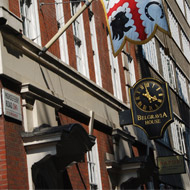
College issues statement following meeting with homeopathy supporters
The RCVS has published a statement following its meeting with the British Association of Homeopathic Veterinary Surgeons (BAHVS) and its supporters on the subject of complementary medicines.
The meeting took place on the afternoon of Monday 16 April where the College listened to views on the subject of homeopathy and received numerous testimonials describing homeopathic treatments.
The statement reads: 'Following the meeting we have agreed to reiterate to the BAHVS what is considered to be a recognised evidence base / sound scientific principles, so that they can supply whatever evidence they consider relevant to substantiate their views, as members of the veterinary profession, on the appropriateness of homeopathy as a treatment for animals.
'We acknowledge the strength of feeling amongst some animal owners over RCVS Council’s position statement on the veterinary use of complementary and alternative medicines last November. However, we would like to reiterate that this position statement does not constitute a ban, as some people believe.'
The RCVS adds that is is not preventing veterinary surgeons from treating animals with complementary therapies. However, it expects treatments that are not supported by scientific evidence to be offered alongside, or complementary to, treatments that are.
The statement continues: 'We believe it is vital to protect the welfare of animals committed to the care of the veterinary profession and the public’s confidence in the profession that any treatments not underpinned by a recognised evidence base or sound scientific principles do not delay or replace those that do.'
Image (C) RCVS



 The veterinary mental health charity Vetlife is inviting the veterinary community to join it for a sponsored cold-water dip.
The veterinary mental health charity Vetlife is inviting the veterinary community to join it for a sponsored cold-water dip.